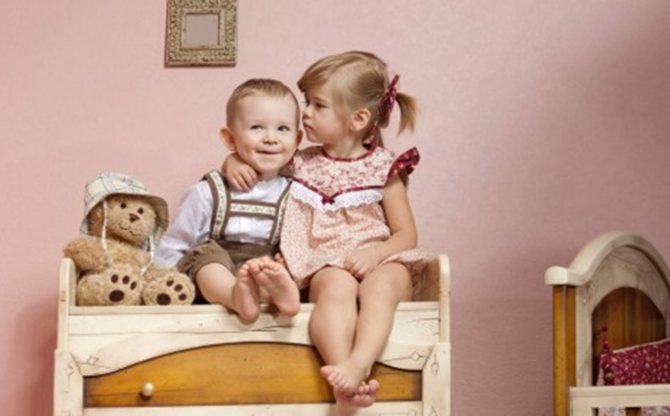After the birth of a brother or sister, has the eldest child changed beyond recognition? Can't find your way to it? It's all about childhood jealousy, which needs to be dealt with before war breaks out in the family!
Jealousy is a negative phenomenon that affects not only adults, but also children. At the same time, most often children are jealous of their parents who brought another child from the maternity hospital.
Watching how vigorous activity develops around the newly-minted family member, they begin to feel their own uselessness and are gradually filled with negative emotions towards their brothers or sisters.
Where does rivalry come from ↑
It is important to understand that childhood jealousy is, first of all, a serious struggle for the attention of mom and dad. The older child perceives the younger one as a competitor and tries to “deal” with him in all available ways.
The fear of losing parental love and care pushes him to aggression, disobedience, as well as attempts to cause pain and inconvenience to the baby.
Moreover, not wanting to share the family’s attention with a newborn “interference,” the older offspring can feign illness or actually become ill, seriously and for a long time.
Signs of jealousy of an older child towards a younger one ↑
Jealousy of an older child towards a younger one can be recognized by the following symptoms:
- Copying infant behavior . Completely unexpected for adults, the child begins to behave like a baby, refuses to dress himself, go to the potty, and even tries to cling to his mother’s breast. This behavior is dictated by the erroneous conclusion that weak and helpless children are loved much more.
- Being withdrawn or overly active . The body of a child experiencing the pangs of jealousy is subjected to severe stress. Hence the mood swings, tearfulness, increased excitability, as well as all the other “charms” of an affective disorder.
- A pronounced rebellious attitude . In an effort to attract the attention of his father and mother to his person, the child rushes to “all bad things.” Previously, such a well-mannered and quiet child begins to misbehave, refuses to obey, does not recognize anyone’s authority, and goes against everyone and everything.
Are you trying with all your might to keep your other half? Find out how to make a guy jealous. Read the article about ways to pacify jealousy towards your ex.
What to do
To begin with, parents should understand that the baby is not to blame for anything. Due to his age, he still does not know how to cope with emotions and cannot take control of them.
The best option is to be patient and tirelessly prove to the eldest that he is loved no less than his younger brother or sister.
What to do if an older child is jealous of a younger one consultation on the topic
What to do if the older child is jealous of the younger one?
The main task of parents is to give their eldest child not just a brother or sister, but a friend. That is, a dear little man for whom the eldest will go “through fire and water.” Of course, you need to prepare your baby in advance for the arrival of a baby in the family. But if you couldn’t do this (for some reason) or didn’t have time, then be much more attentive to your older child!
Rules of conduct for parents
* Do not push away a child if he comes to you for a portion of tenderness and affection. Even if you have no time and are terribly tired, find time to hug and kiss your older child - let him feel just as loved as the younger one.
* Do not swear if the child begins to behave like a baby - sucking a pacifier, distorting words, putting on diapers. Smile, laugh with him, support this game.
* Don’t constantly poke your older child about his “responsibility.” Yes, he is the eldest, yes he knows and understands more, but this does not mean that he has ceased to be a child. He still loves to play pranks, cannot handle whims, and plays noisily. Accept this as a fact. Playing “elder” should be a pleasure for a child, not a burden.
* Do not compare children, especially if the older one looks more guilty in some action than the younger one. For example: the youngest child, when he is just learning to put things in order in the room, quickly copes with the task, while the older one, wanting to attract attention, takes a long time to put things in order and is capricious. First of all, the parent will be tempted to say: “But look at Masha (Sasha), how quickly he (she) did it, and you?” But it is better, together with the younger one, to offer help and praise both equally, reward equally.
* Listen to your child. Always and definitely. Everything he cares about should be important to you. Don’t forget to tell your child that he was just as tiny (show photos), that he was also rocked in your arms, kissed on his heels and “walked” with the whole family.
* The older child spent half a day drawing flowers in a vase for you. Junior ruined this drawing in 2 seconds. Yes, your youngest is “still very small,” but this does not mean that this phrase can reassure the older child. Be sure to sympathize with him and help him with a new drawing.
* Find time during the day to be alone with your older child. Leave the baby to dad or grandma and devote at least 20 minutes to only him - your eldest child. Not for creativity or reading (this is a separate time), but specifically for communication and intimate conversation with the child.
* Mom is busy with the youngest, bathing or changing him - let dad do something interesting with the first-born at this time, take him for a bath or play his favorite game with him
* Don't let your fatigue get the better of you - be attentive to words, gestures and actions addressed to your child.
* Don't break promises. They promised to play - play, even if you fall off your feet. You promised to go to the zoo this weekend? Don't try to hide behind household chores!
* Grandparents, like no one else, are able to wisely reassure a child, tell him about how everyone around him fussed with him when he himself was a baby. The technique of watching family videos is very effective. When the older child sees that he, too, was a baby, sees the joy on the faces of relatives during discharge and common holidays, he will more easily and figuratively perceive the words of the elders about equal love for both children.
* More often show your child examples of other families where older children look after the younger ones, read them fairy tales and adore their teddy bears more. Take your child to visit such families, talk about your experience (or the experience of relatives), read and watch fairy tales about friendly sisters and brothers.
* To prevent your child from feeling too sad and lonely, come up with new entertainment for him. Find a club or section where he can meet new kids and find interesting activities for himself. You can find sports entertainment for an active child under 5 years old. The world for a child should not be limited to the walls of the house. The more interests, the easier the child will survive his mother’s temporary “inattention.”
* If you have assigned the status of “senior” to your child, along with new obligations and certain responsibilities, then be kind and treat him as an elder. Since he is now an adult, it means he can go to bed later (at least 20 minutes), eat forbidden foods (for example, lemonade and candy), and play with toys that “the younger one is not yet old enough for!” The child will really like such “benefits”, and the “senior” status will become less burdensome.
* If you caress the younger one, immediately caress the older one. If you are buying something for a newborn baby, do not forget about your firstborn - buy him something too. The child should not feel disadvantaged. Equality is paramount! Feed equally, toys equally, so that there is no envy, punish both or neither at once. Don’t allow a situation where the younger one can and is forgiven everything, but the older one is always to blame.
* Don't change traditions. If the child slept in your room before the baby arrived, let him sleep there for now (move him to the nursery carefully and gradually - later). If you splashed around in the bathroom for half an hour before going to bed, and then listened to a fairy tale until you fell asleep, let it stay that way.
* Do not take toys for a baby from an older child. Children at a young age are jealous even of rattles and pyramids that they have not played with for a long time. “Replace” them with new toys “for big children.”
* Do not leave children alone, even for a couple of minutes. Even in the absence of jealousy, the older child may, out of great love and desire to help his mother, do something stupid - accidentally drop the baby, cover him with a blanket, cause injury during play, etc. Be vigilant!
* Do not demand help with the younger one, but ask politely for help; The child is not required to help you care for the baby. Even if it is already quite big.
How to avoid ↑
If you want to prevent the occurrence of childhood jealousy, you need to listen to the following advice:
- A lot of attention in the absence of mom . Anticipating an imminent birth, you should take care that the child does not feel abandoned while the person closest to him is in the maternity hospital. If possible, it is better to invite a grandmother to visit for a while, who will support her grandson and help him endure a short separation more easily.
- Don't forget about the gentle "hugs" . Returning from the maternity hospital, it is important first of all to hug your first-born tightly, thereby showing him how much his mother missed him. Unfortunately, many women, caught up in new emotions, forget to perform this sacred ritual, thereby traumatizing the child and giving rise to the first signs of jealousy.
- We are preparing a pleasant surprise . To ensure that the first meeting of the children is as successful as possible, it would not be a bad idea to purchase a gift for the older offspring from the younger one in advance. It is best to buy something large and immediately noticeable. As practice shows, such a trick often helps to reconcile a potential jealous person with a new family member.
- We do not resist the desire to help . In the first months, the eldest son or daughter should not be left alone with the baby. However, if the child shows a strong desire to take care of the little one, it is quite possible to meet him halfway and let him play with him a little. The main thing is to stay close at all times and gently stop any attempts to hurt the newborn, try to feed or change him.
- We find a few minutes for exclusive communication . Even the most violent protests against the presence of a new little person in the house will be eliminated if the older child is given some time for personal communication with mom and dad. At the same time, it is not at all necessary to spend your leisure time on useful developmental activities; sometimes it is enough to look at a book or have a fight with sofa pillows.
- We do not take away the childhood of our firstborn . Some parents who have decided to have a second child have the habit of reminding the eldest that he has already grown up and simply does not have the right to behave like a little one. Without exaggeration, we can say that this is an erroneous position, as a result of which the child often begins to feel disadvantaged.
Preventing jealousy

In many families, it happens that the first child is jealous of younger children. Your task is to do everything to completely eliminate such a turn of events and prevent any manifestations of jealousy.
- While the mother is in the maternity hospital, it is very important that the rest of the family show as much care as possible for the older child. Especially if he had not previously been separated from his mother for a long time.
- Don't change your child's routine.
- It is not recommended to take a small baby to the maternity hospital. It’s better to let him see his sister or brother in a familiar environment, and not surrounded by people in white coats.
- Be sure to hug your eldest son or daughter immediately upon arrival from the maternity hospital.
- It is a good practice to purchase a weighty toy, which is supposedly presented from a newborn to an older brother or sister.
- Sooner or later, relatives and other guests will come to your house to congratulate you on the birth of a new child. It is very important that they carry gifts for two children and do not single out only the little one. If for some reason the guests came with only one gift, then you should have some other gifts hidden that you can give to the guest so that he can present it to the eldest.
- It is unacceptable to leave children alone. An older baby may want to explore the little one and accidentally harm him.
- If the elder takes the initiative, tries to feed or pick up the little one, then you should not shout and scold him for this. It’s better to praise him for such zeal and explain that it’s better if you do it together.
- Remember to hug your older child as often as possible. He should not feel lonely or abandoned.
- Be sure to make sure you have time for your firstborn. Play with him, read books. It is important to do this regularly.
Advice from a psychologist ↑
- immersed in caring for a newborn, do not forget about the older child, because for children the worst punishment is to face maternal indifference;
- actively involve your first-born in your activities related to caring for the baby, this will give him a sense of self-importance and allow him to maintain balance in the family;
- noticing that the child takes the initiative (brings a diaper without a reminder, turns on the water at the right time, finds a lost pacifier), be sure to praise him loudly;
- do not scold the older child if he is annoyed or indignant by the behavior of the younger one, just recognize that he has the right to various emotions, including negative ones;
- take the side of the first-born if you see that he is right, and the brother or sister is simply trying to take advantage of the fact that they are small and with the help of this achieve the desired goal;
- never compare your children, giving preference to one, they may be completely different, but should receive the same amount of love and recognition.

Acknowledge children's feelings
To help children, it is necessary to give them the right to experience any emotions. Of course, the jealousy experienced towards a beloved and defenseless baby seems terrible. However, the elder has the right to say: “I don’t like the baby at all! He always yells and smells bad!” Even if such statements upset you, remember that adults must first control their feelings. Under no circumstances should you attack and shout: “How can you say that?!” Poor brother! It’s better to just nod or ask them to tell you what exactly irritates your son or daughter.
If you talk through your baby’s possible feelings from birth, you will help both him and your older child. Say: “Brother is crying so much because he’s hungry” or “His tummy hurts. Do you remember how your tummy hurt recently? I felt very sorry for you, and I stroked you.” This explanation is easier to understand than a toddler screaming for no apparent reason. Perhaps the older one will even want to take pity on the younger one and pet him. But don’t insist, because this is the personal right of children.
Prevention of childhood jealousy ↑
You can avoid childhood jealousy if you prepare your first-born for the birth of your baby during pregnancy. To do this you need:
- Go to visit large couples. Having seen how other children play together amicably, the child will undoubtedly want to have cheerful brothers and mischievous sisters. Moreover, unlike friends from the playground, they will be nearby day and night.
- Calling a spade a spade . When you become pregnant, you don’t need to say that “a watermelon is growing in your tummy.” It is better, without resorting to such excuses, to immediately say that you are expecting a baby. At the same time, you should not show your emotions too violently; it is enough to maintain a joyful but calm tone.
- Don't ask stupid questions. When slyly asking: “Do you want a brother or sister?”, parents are not always prepared for the child to answer negatively. If you don’t want to give him the feeling that his opinion is not listened to at all, think carefully before becoming interested in such things.
- Innovate early . When planning to move your eldest from a crib to a teenager's (or from the parent's bedroom to a separate room), do this long before your trip to the hospital. Otherwise, the child will perceive his “moving” as an expulsion and will blame the newborn for it.
- Help bring father and son or daughter closer together . Since in the near future the mother will have to leave home, leaving the child in the care of the head of the family, it will not be superfluous to make sure that they get along well. Joint games, morning procedures (washing, exercises), as well as a bedtime story can help create a close connection.
- Talk about your last pregnancy . The child will probably be interested to know how the house prepared for his birth. Calling on all your eloquence to help, you can tell your beloved child that you were really looking forward to it, bought the necessary things, rejoiced when he was born, and now you are incredibly glad that he will be able to celebrate the birth of another family member with you.
Do you think there is a reason to provoke your spouse’s jealousy? Find out how to make a man jealous. Read the article about how to make a girl jealous of you.
What to do if a guy is very jealous? The answers are here.
The jealousy of an older child is not only a negative phenomenon that must be overcome in order for peace and happiness to reign in the family, but also a source of uncontrollable feelings of guilt.
Mothers, forced to devote most of their time to their newborn children, often feel that their firstborns are terribly deprived. At the same time, they completely lose sight of the fact that older children are the only ones whom their mothers loved, albeit a little, but still longer.
It is a mistake to believe that a child is deprived; it is right to rejoice that another loved one has suddenly appeared in his life! And this is great happiness!
Birth of the youngest child
When a youngest child is born in a family, the eldest will be jealous. and even the most loving and attentive parents cannot avoid manifestations of jealousy. It can only be reduced as much as possible.
Jealousy manifests itself especially strongly if the age difference between children is small (2-3 years). But even with other age categories of children, jealousy is always present to some extent.
A child, at the birth of a brother or sister, always feels that part of the attention that was given to him now belongs to another person.
But the older child, in fact, remains a little person who requires a lot of attention from his parents, no less than the younger one.
This is where whims, disobedience and even a negative attitude towards the younger family member appear.
Parents often begin to use the older child for “give and fetch” purposes, and he begins to feel like a subordinate who is not loved, but only exploited.
If the older child is able to look after the younger one for some time, it becomes a tedious task, and the older one may offend the younger one at times when the parents are not around.
The older child's dissatisfaction may also be caused by the difference in the demands that parents place on their children.
The older one can be punished or scolded for certain actions, but the younger one can forgive absolutely the same behavior without any words of reproach.
It would seem that the youngest child has all the priorities, but this is not so. He, too, may not feel comfortable when the older child wins games or is able to do something that the younger one cannot do.
The younger one often has to wear out his clothes, while the older one has a wardrobe of new things.
The younger child believes that the parents trust the older one, but they perceive him as inexperienced and inept.
In connection with this perception of the family situation by children, parents are faced with a very serious task - to ensure that brothers and sisters have strong family feelings, always help each other and are the closest and dearest people, ready to provide support in any situation.
What should parents do? How to raise children so that feelings of jealousy do not ruin the relationship between them for life?











